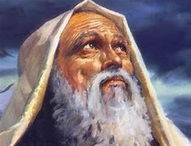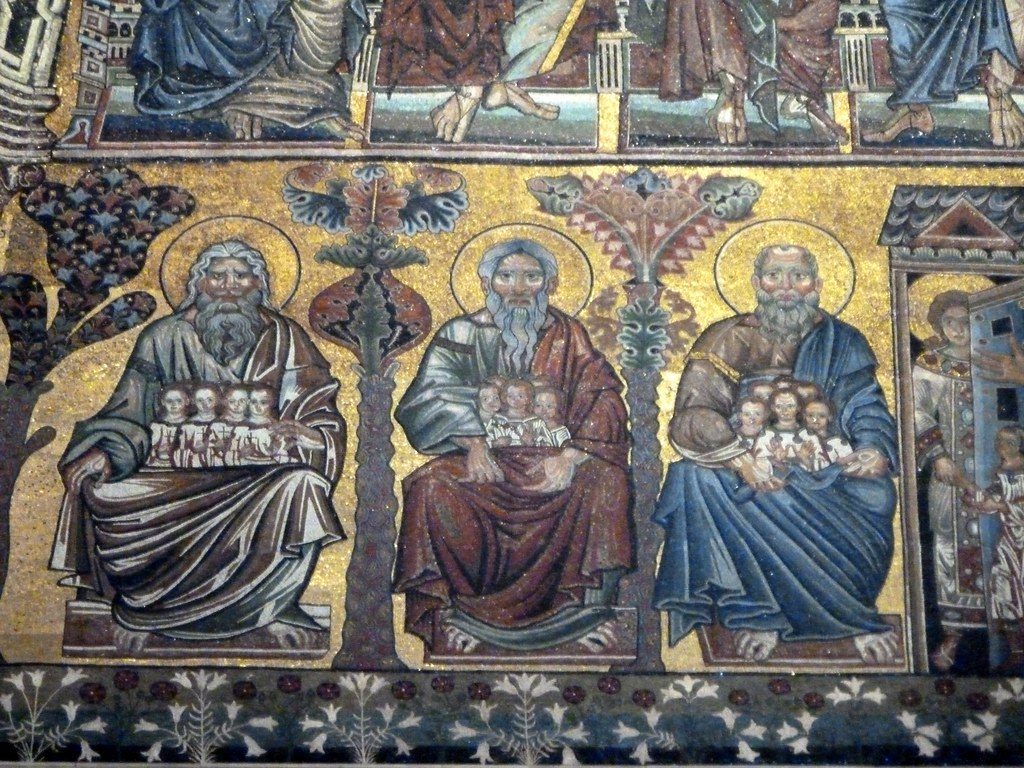
Genesis 23
Genesis 23:2, Sarah died…in Hebron.See notes at Genesis 22:19.
And to weep for her. The small letter kaf in v’liv-kotah indicates that Abraham’s expression of grief was constrained. The righteous person knows that there is an afterlife; death is only a temporary separation, and he does not give way to excessive sadness. The small kaf teaches us that Abraham did not parade his grief, but bore his pain in his heart, not in public. (Munk, p. 137; The ArtScroll Series Interlinear Chumash—Bereishis/Genesis, p. 116). The Tikkun (p. 47) gives a completely different explanation for the small kaf. Thus, this calls into questions the validity of rabbinic speculation in these matters.
Genesis 23:3, Abraham stood up. In the face of an extreme trial—the death of Sarah—Abraham stood up to bury his dead. This is even in face of the fact that Abraham and Sarah seemed to have been estranged and living in separate towns since the akeidah. At the same time, rather than remaining incapacitated by his grief, he rose up as a mighty man and dutifully took care of business and buried his dead.
Genesis 23:3ff, I am a foreigner. According to the covenantal promises of YHVH, Abraham was the rightful owner of the land of Canaan, not the children of Heth (the Hittites), yet how did Abraham treat the ruling Canaanite “squatters?” He refrained himself from treating his rivals with impudence and arrogance but treated them with honor and respect. How does Scripture enjoin us to treat human authorities? Can we respect their positions of authority without flattering them or condoning their wickedness? Ponder the demeanor of other biblical personages in their dealings with earthly, pagan authorities: Moses, Nehemiah, Daniel, Yeshua, and Paul for example.
Genesis 23:15, Four hundred shekels of silver. Abraham paid a full and possibly even an inflated price for the cave of Machpelah without balking. In so doing, he maintained a good reputation among the heathen. Matthew Henry in his commentary on this passage states, “The religion of the Bible enjoins [us] to pay due respect to all in authority, without flattering their persons, or countenancing their crimes if they are unworthy characters.” The righteous must maintain a good reputation with those who are outside the spiritual body of the redeemed believers (1 Tim 3:7) by treating them with honor and respect, especially those in our community and place of work.
Genesis 24
Genesis 24:2, So Abraham said. In appointing Eliezer to find a wife for Isaac, Abraham was deputizing him to become the friend of the bridegroom, or the family representative in this important mission. (For more on this subject, see notes at John 3:29.)
Genesis 24:2, 9, Put your hand under my thigh. (Heb. yarek; see also Gen 47:29) Abraham’s servant literally placed his hands over Abraham’s testicles thus swearing an oath on Abraham’s projected progeny, even as in modern times we place our hands on the Bible. Interestingly, the word testicle or teste derives from the Latin words testis meaning “testimony, testify and testament.” Yarek is the same word the KJV translates “hollow of his thigh” in Genesis 32:25 and 32, although, in this case, it seems to be referring to the tendon of the hip.
What Abraham had his servant do seems a bit indiscreet if not lewd in our culture, yet this was obviously an accepted custom in this ancient society.
The fact is that the Hebrews were an earthy, simple and basic people in their day-to-day life; they were without pretenses or veneers in their day-to-day interactions. Yet in their understanding of and walk with Elohim, they were deep and had a broad understanding as evidenced through the pages of the Bible. Moreover, because they had the Torah, they were much wiser and at a higher level spiritually than the nations around them who had rejected Elohim and who, instead, worshipped sticks, rocks, trees, idols and demons resulting in all sorts of idolatrous and licentious perversions. Paul talks about this in Romans 1:18–32.
What is the take away here?
The Psalms in a couple of places tells us that the fool has said in his heart that there is no God (Elohim) (Pss 14:1; 53:1). As highly developed and advanced intellectually and technologically as our modern society may be, most of the intelligentsia and erudite of our day are a bunch of educated idiots or fools, who deny the existence of Elohim, while they mock the Bible. Instead, most them, being the highly rationalistic and materialistic people that they are, they worship their own minds, their own bodies and other material things all of which, by biblical definition, are idols. Moreover, they believe in unproven theories or mythologies like macro-evolution and they predict the end of the world in a few decades due to global warming or climate change. Like the ancients, many of them worship the same demons and sacrifice their children to the same demon gods (called abortion) as their ancient Baal and Moloch worshiping predecessors.
While the ancient Hebrews may have seemed like a rather “crude,” definitely earthy and a bit indecent race in some of their cultural practices, they were nevertheless a people who knew Elohim and obeyed him, had a deep knowledge of spiritual matters, and possessed wisdom and understanding of life issues. This is in stark contadistinction to many high-minded intellects, who in all of their erudition have totally missed Elohim and in reality still worship sticks, stones, trees and material objects (e.g., homes, money, boats, cars, art objects, political power, education, their bodies), and believe in mythologies (e.g., evolution and Marxism) rather than the Truth of YHVH Elohim of the Bible.
The example of Paul the apostle comes to mind, who wrote the following words some 2,000 years after the time of Abraham (in reality, things hadn’t changed much from Abraham to Paul, and they have not changed much from Paul till now either, for human nature remains the same):
For the message of the cross is foolishness to those who are perishing, but to us who are being saved it is the power of God. For it is written: “I will destroy the wisdom of the wide, and bring to nothing the understanding of the prudent.” Where the wise? Where the scribe? Where the disputer of this age? Has not God made foolish the wisdom of this world? For since, in the wisdom of God, the world through wisdom did not know God, it pleased God through the foolishness of the message preached to save those who believe. For Jews request a sign, and Greeks seek after wisdom; but we preach Christ crucified, to the Jews a stumbling block and to the Greeks foolishness, but to those who are called, both Jews and Greeks, Christ the power of God and the wisdom of God. Because the foolishness of God is wiser than men, and the weakness of God is stronger than men. For you see your calling, brethren, that not many wise according to the flesh, not many mighty, not many noble, are called. But God has chosen the foolish things of the world to put to shame the wise, and God has chosen the weak things of the world to put to shame the things which are mighty; and the base things of the world and the things which are despised God has chosen, and the things which are not, to bring to nothing the things that are, that no flesh should glory in His presence. But of Him you are in Christ Jesus, who became for us wisdom from God—and righteousness and sanctification and redemption—that, as it is written, “He who glories, let him glory in YHVH.” (1 Cor 1:18–31. emphasis added)
In light of what the Bible, the Word of Elohim, has to say on this subject, being a “fool” for YHVH Elohim-Yeshua far outweighs in value to being “wise” in the eyes of this world!
Genesis 24:4, Take a wife for my son Isaac. Some Bible students see in Abraham’s sending Eliezer his servant as an allegory of our Heavenly Father choosing a bride for Yeshua, his Son with the help of the Holy Spirit. The analogy goes like this: When speaking to Abraham, YHVH refers to Isaac as “your only son…whom you love” (Gen 22:2). In this statement, it is hard to miss the similarity with the well-known John 3:16 passage where Yeshua refers to himself as the only begotten Son whom his Father in heaven loves. Isaac is an obvious prophetic picture of Yeshua in that Abraham sacrificed a ram in place of his only son whom he loved on the very spot where, one thousand years later, the Temple of Solomon would be built and where sacrifices were made to atone for men’s sin.
Moreover, this is the same spot later in biblical history where Yeshua himself was condemned to death and not far from there became the Lamb of Elohim who was sacrificed to atone for men’s sins.
What is even more amazing is that the name Eliezer means “my El helps,” which many biblical students see as an allusion to the Holy Spirit who helps or comforts us, and to which Yeshua refers to as the Comforter or Helper (e.g., John 14:16). It is the Holy Spirit that is choosing and preparing a bride from among called and redeemed Israelites for Yeshua the Messiah, the Son of Elohim.
Genesis 24:6, 8, Beware [Heb. shamar] that you bring not my son there again. Why was Abraham insistent that Isaac not be exposed to Babylon? What was there to beware of (shamar/RNA)? The Hebrew word shamar means “to guard against, protect from, keep watch and ward, preserve, keep oneself from.” The answer is found in verse seven.
YHVH Elohim of heaven, who took me from my father’s house and from the land of my family, and who spoke to me and swore to me, saying, “To your descendants I give this land,” He will send His angel before you, and you shall take a wife for my son from there.
This teach us much about protecting our children and loved ones from the corrupting influences of this world. We must be ever vigilant like a soldier on guard duty to preserve and protect our children (or those under our spiritual care) from those things that could lead to their spiritual ruination. It is our divinely mandated duty to show them a better path and to teach them diligently in the way they should go (Deut 6:6) that leads to life and not death (Deut 30:15–16, 19–20).
Had Abraham allowed Isaac to return to Babylon with Eliezer, this country boy might have been tempted to remain there due to the alluring appeal of the wealth, worldly influences and cosmopolitan glamor of city life. Had Isaac remained in Babylon, then YHVH’s plan for Abraham’s descendents would have been totally thwarted. Abraham in his wisdom was looking out for the spiritual destiny of his son and protecting him from any outside influences that may have sidetracked him from YHVH’s perfect will. Abraham was exercising wisdom on Isaac’s behalf in that he in his wisdom and understanding was able to see the future in ways that a young man is not able to see due to a paucity of life experience and understanding resulting therefrom.
YHVH had led Abraham out of the spiritual filth of Babylon. In no way did he want Isaac to go back to what he had left behind. If Isaac had seen the prosperity and convenience of a Babylonian lifestyle, he might have been tempted to stay there—especially if he had found a wife in that place.
Abraham insisted that any potential mate leave Babylon and come to Isaac and not vice versa. Only a wife was willing to leave Babylon would be a suitable matriarchal soul mate to Isaac and to accompany in fulfilling his divine destiny.
Are we investing the necessary time and energy into our children to insure that they do not return to the spiritual Babylon from which we fled prior to our becoming followers of Yeshua? Are we guiding them in finding spouses who are willing to leave spiritual Babylon and to become disciples of Yeshua?
Genesis 24:12, Give me success. Scripture directs us to, “Trust in YHVH with all your heart and lean not unto your own understandings, but in all your ways acknowledge him and he shall direct your paths” (Prov 3:5–6). Eliezer, Abraham’s servant, was a man of prayer who sought guidance from heaven in fulfilling his mission in finding a wife for Isaac.
Abraham was a man of faith—even the father of the faithful (Rom 4:12, 16). Eliezer was likewise a man of faith. Abraham had taught him well, just like a son.
How does Eliezer evidence faith? Simply this. He blesses Rebekah even before he knows who she really is (Gen 24:22) all on the basis of an answered prayer.
Do we walk in such trusting faith, day-by-day, moment-by-moment? Are we teaching the little ones under our charge these same attributes as Abraham had taught his dependents?
Genesis 24:14, Let it come pass. Here Eliezer asks for a sign from heaven. It is not wrong to ask for a sign from Elohim as one is endeavoring to fulfill his will and stay on the right track spiritually. However, when men test Elohim, seek signs out of doubt and unbelief with little desire to obey him, the Yeshua’s statement is applicable in this case: “An evil and adulterous generation seeks after a sign,” (Matt 12:39).
Genesis 24:17–18, Let me drink. See notes at Mark 9:41.
Genesis 24:30, When he saw. Laban’s preoccupation with materialism (a typical trait of those who are caught up in Babylonian or worldly mores) would dominate his life for many years to come as the story of Jacob’s dealings with him would later prove. This teaches us that the character traits one manifests as a child or youth are often precursors and indicators showing us how a person will act later on whether good or bad. In Laban’s case, he was greedy and covetous as a youth and also as an older man.
Genesis 24:45, Speaking in my heart. Obviously, Eliezer was in constant communications with YHVH through prayer. Is this not a character trait of a righteous person? 1 Thessalonians 5:17 instructs us to pray without ceasing. In Luke 18:1–7, Yeshua teaches about the benefits of righteous and prevailing prayer. How often do you pray? Once a day? When you pray, is it merely a morning and/or evening ritual that leaves your soul (mind, will and emotions) untouched and unchanged? Is this the kind of relationship the Father is seeking with you? A mighty man of Elohim when asked the question, “How long do you pray each day?” He replied, “Seldom do I pray more than one-half hour, but seldom do I go more than a half hour without praying.” Could this be said of you?
Genesis 24:53, Then the servant brought out jewelry. Here Eliezer is presenting Rachel’s family with a dowry. What was the purpose of the dowry? In ancient times, a family’s efficiency and work force was diminished when losing a daughter to marriage. The dowry compensated the family for the loss of a worker. Often unmarried daughters not only fetched water from the well, but would also tend the father’s flock (Gen 29:6; Exod 2:16), tend to household chores or work in the fields (Manners and Customs, pp. 127–128). Additionally, the father was expected to give part of the dowry to his daughter in case the marriage failed, she would have some financial resources to fall back on. Leah and Rachel complained when their father failed to provide for them thusly (Gen 31:15; ibid., p. 128).
Genesis 24:58, I will go. Rebekah demonstrated unusual faith. She, like her Uncle Abraham and Aunt Sarah before her, was willing to leave the comforts and security of Babylon and to go with a stranger to a strange place and to live as a nomad. When asked, “Will you go with this man?” she replied quickly and to the point, “I will go.” Do you have such unreserved devotion to Yeshua, the Lover of your soul and your Betrothed, that you will go WHEREVER he leads no matter how difficult or uncomfortable the way? Or have you placed restrictions and qualifications on him? Compare your faith on a scale of one to ten with that of Abraham, Eliezer and Rebekah.
Genesis 24:62, The well of Lachai Roi. Isaac was a man of the well, for he is associated with a well eight times (24:62; 25:11; 26:19, 20, 21, 22, 25, 32). Eight is the biblical number of new beginnings. Spiritually, a well represent spiritual life and the number eight signifies new beginnings. When we drink from the well of salvation, new life from within springs forth! (See Isa 12:3 and John 4:7–13.)
The first mention in Scripture of Isaac after he was bound to the altar on Mount Moriah (Gen 22) was that he “came from the way of the well Lachai-roi” (Gen 24:62). If Isaac’s binding to the altar prophetically typified the death, burial, resurrection and ascension of Yeshua, and at the next mention of Isaac we find him at the well Lachai-roi (meaning “the Living One who sees me”) what does this spiritually typify? After is resurrection and ascension, Yeshua promised to send the Comforter or Holy Spirit to his disciples (John 16:7). Yeshua likens the same Holy Spirit to water from a well (John 7:37–39), and to the giver of spiritual gifts (Eph 4:9).
Genesis 24:63, Went out to meditate.What does this one verse tell us about the kind of man Isaac was? Do you have moments each day where you turn off the world to connect with and listen to YHVH, to reflect before YHVH on the past day, and to meditate, pray and supplicate? Who are other notable biblical personages who would slip away from the press and exigencies of life to spend time alone with their Heavenly Father? If Yeshua came to your mind, you would be correct (Matt 14:23, 26:36; 6:46; Luke 6:12).
Genesis 24:67, Isaac brought her. Marriage customs during biblical times in the Near East are in stark contrast to those of our modern, western culture. As Marvin Wilson explains, in biblical times, “couples were expected to grow to love each other after marriage. In the modern West, the emphasis has been more on marrying the person that you love rather than learning to love the one that you marry.” The biblical values relating to marriage are exemplified in this verse where the marriage of Isaac and Rebekah was arranged and they met for the first time on the day of their marriage. As Wilson notes, “the text states that “Isaac brought her into the tent of her his mother Sarah, and he married Rebekah. So she became his wife, and he loved her.” This verse illustrates the Jewish approach to marriage. Love develops after marriage; it was not a matter of falling in love and then marrying (Our Father Abraham—The Jewish Roots of the Christian Faith, p. 202, by Marvin R. Wilson).
Chapter 25
Continue reading



